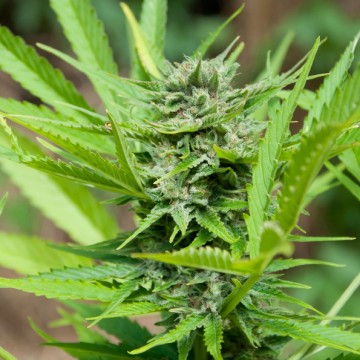Why Legalizing Marijuana Makes Sense for Oregon
Thursday, October 09, 2014

Photo credit: iStock
People are using marijuana despite the fact that over the last 10 years, more than 99,000 people in Oregon were arrested or cited for marijuana, according to the Oregon State Police. One in every 14 arrests in Oregon is for small marijuana offenses; that’s 7 percent of all arrests in the state.
It is distracting police and sheriffs from taking on violent crimes in a time when there are untested rape kits, unsolved murders and missing children.
A yes vote for Measure 91 is not an up-or-down vote on whether marijuana should be allowed in our state. Marijuana is already here, being sold widely in an underground economy.
Voters are deciding on who will regulate that market.
Drug dealers and cartels
We can continue allowing drug dealers and cartels to call the shots while we arrest thousands of otherwise law-abiding Oregonians for small amounts of marijuana or we can vote yes to regulate the market, allow responsible adult use and better control it for those who shouldn’t have it.
Right now, marijuana is sold in back alleys and on playing fields. The sellers -- drug dealers -- don’t ask for ID, may try to sell more dangerous drugs as well and they certainly don’t provide any drug-prevention education.
Nobody really knows what they’re selling because the product is untested, unlabeled and unregulated, while gangs and cartels turn a tax-free profit.
Under the regulated system of Measure 91, marijuana would be sold at licensed, audited, inspected and properly zoned facilities that are strictly regulated and away from schools. The sellers would be licensed salespeople who have passed background checks, who ask for ID, and who would be held accountable in police sting operations to make sure they don’t sell to youth.
Packaged and labeled product
The state can continue to adjust the law for more control, instead of leaving marijuana to organized crime and cartels as we do now.
Only adults 21 and older could buy and possess marijuana under Measure 91. The product would be tested, and packaged in labeled, child-proof containers.
New revenue from taxes on marijuana will go to schools, state and local police, mental health and addiction services, drug-treatment and drug-prevention programs. This revenue will be distributed through a special account that, by law, must go to these programs.
Learning from others
When it comes to regulating, taxing and legalizing marijuana, Oregon has the benefit of going third. We’ve already learned a lot from Washington and Colorado, where they’ve adopted systems similar to Measure 91. In both states, arrests of individuals for marijuana has dropped by over 80 percent and police are freed up to focus on serious crime. The black market in those states is shrinking. Traffic fatalities are not up, they’re down. Adult use is not up. Teen use is down.
Prevention programs are working. Lewis Koski, director of Colorado’s Marijuana Enforcement Division, reports not a single marijuana dispensary would sell marijuana to an underage buyer in testing by undercover sting operations.
By the time the first licensed storefronts open in Oregon in 2016, there will be nearly a decade of combined experience in the three states. Measure 91 is designed with built-in flexibility to continue adjusting the law in the future if needed.
Measure 91 controls marijuana from seed to sale; penalizes access by minors; keeps drug-free workplace rules; maintains driving-under-the-influence laws, and prevents public use.
Concerning Measure 91, retired Oregon Supreme Court Justice William Riggs said, “I think it’s inevitable that marijuana (legalization) is coming to Oregon in one form or another, and I hope it comes in the form of a good bill like this one.
"If we are going to have marijuana in Oregon, this is the way to do it.”
Treating marijuana as a crime has cost us dearly in police resources, it has fed drug cartels and drug dealers, and it hasn’t controlled marijuana at all.
Measure 91 is a more sensible approach.
[Editor's note: This piece was submitted in response to Scott Bruun's piece, High Times for the Pizza Lobby: Why Legalizing Marijuana is a Bad Idea, which was published on GoLocalPDX last week.]
Anthony Johnson is the chief petitioner and a co-author of Measure 91.
Banner Photo Credit: iStock
Related Articles
- New York Times Endorses Oregon’s Marijuana Legalization Efforts
- EXCLUSIVE INTERVIEW: Rick Steves Slams ‘Racist’ Anti-Pot Laws
- High Times for the Pizza Lobby: Why Legalizing Marijuana is a Bad Idea




Follow us on Pinterest Google + Facebook Twitter See It Read It